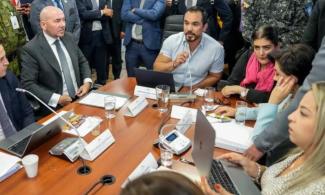
This request was contained in a complaint filed by President Andres Manuel Lopez Obrador on Thursday, calling Ecuador’s actions a violation of international law.
Mexico has asked the International Court of Justice to expel Ecuador from the United Nations because of a recent police raid on its embassy in Quito.
This request was contained in a complaint filed by President Andres Manuel Lopez Obrador on Thursday, calling Ecuador’s actions a violation of international law.
“The court, in accordance with the United Nations Charter, should approve the expulsion, and there should be no veto,” Lopez Obrador said at a news conference.
Mexican Foreign Minister Alicia Barcena echoed the president's statement on social media, saying Ecuador should be brought "to account for flagrant violation of the inviolability of our embassy and attacks on our staff".
“The letter and spirit of international law is the guide for our steps,” she added.
Embassies are considered secure areas. Although they are not "foreign soil" (a popular misperception), international law prohibits local police from entering them.
This, in turn, permits embassy workers to carry out their duties without fear of arrest or harassment by local authorities.
The 1961 Vienna Convention on Diplomatic Relations, for example, states: “The premises of the [diplomatic] mission shall be inviolable. The agents of the receiving State may not enter them, except with the consent of the head of the mission.”
However, this “rule of inviolability” has also been used by political dissidents and other figures to avoid arrest by taking shelter in a foreign embassy.
Glas, for example, has twice been convicted of bribery and corruption charges. He was sentenced to six years in jail in 2017, followed by an eight-year sentence in 2020.
Glas had been seeking protection in the Mexican embassy since December, and soon before his arrest on Friday, President Lopez Obrador granted him political asylum in Mexico.
However, late on Friday night, Ecuadorian police mounted the Mexican embassy's wall, burst through its doors, and pointed a rifle at one of its top diplomats.
Video released by the Mexican government on Wednesday shows the officer, diplomat Roberto Canseco, being thrown to the ground as he tried to block police vehicles leaving the embassy with Glas inside.
Mexico has since called for Ecuador’s suspension from the UN. It said the suspension should only be lifted once Ecuador issues “a public apology recognising its violations to the fundamental principles and norms of international law”.
The administration of President Lopez Obrador also severed diplomatic ties with Ecuador as a result of Glas’s arrest.
Other countries and international organisations have likewise expressed concern and outrage over the police raid, calling it a violation of international laws.
On Tuesday, United States National Security Adviser Jake Sullivan said, based on security footage of the police raid, his government believes “these actions were wrong”.
The Organization of American States (OAS) also released a statement saying that “strict compliance” with the international law governing diplomatic relations is “essential”.
In addition, OAS Secretary-General Luis Almagro suggested the situation with Glas should have been handled differently.
Ecuador has defended its decision to storm Mexico’s embassy, though. The government of President Daniel Noboa has questioned whether Glas met the requirements to receive political asylum, and it reaffirmed its commitment to fighting corruption within its borders.
Ecuadorian Foreign Minister Gabriela Sommerfeld also said that a public apology “is not something that is under discussion at this moment”.
Glas, meanwhile, has been on a hunger strike in his prison in Guayaquil. He was briefly hospitalised on Monday.
Rafael Correa, the former president in whose administration Glas served, said the ex-vice president had attempted suicide after his arrest.
Correa himself lives in exile in Belgium and faces a prison sentence in his native Ecuador, likewise on corruption-related charges.